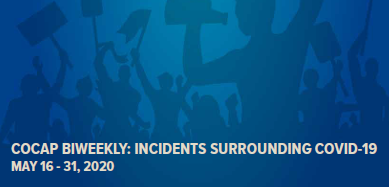Incident Reports
Stitch in time- Editorial about Metropolitan Crime Division's recent initiative to combat human trafficking
2016-03-28
Metropolitan Crime Division's recent initiative to combat human trafficking is a beacon of hope
Harrowing tales of Nepali migrant workers being subjected to extreme torture and their legal helplessness in the Gulf nations have been headlines in Nepal's mainstream media for the past few years. Stories of claimed or unclaimed dead bodies of Nepalis abroad, Nepalis languishing in distant jails without legal support to defend themselves and forced to work under wretched conditions, in the lack of money and documents to get back home, are all too common.
Dreams of thousands of poor Nepalis shatter right after they land in foreign countries. But this has not raised the alarm bells in Nepal yet. In this context, the recent Nepal Police-led initiative to combat human trafficking and rescue victims from several countries has been a beacon of hope. This commendable move calls for cooperation and support from all stakeholders, in what is a "holistic" approach against human trafficking
Developments in the Metropolitan Crime Division (MCD) of Teku inspire hope. MCD has set up a separate unit called Victim support and Coordination Unit to help the victims of foreign employment. The victims duped by manpower agencies come to this unit for justice. MCD activated a toll-free number (1,177) for them a month and a half ago. The police led by division chief SSP Sarbendra Khanal has already rescued 39 male and 19 female victims from Qatar, Oman, Dubai, India, and even from inside the country.
Complaints have been filed through the phone from as far as Portugal, Russia, Malaysia, Kuwait, and Oman. The unit says rescue of 305 people is in pipeline, while eight suspects involved in trafficking have been arrested and more, including some big fries, are under close watch. Police are investigating cases filed by victims against 71 manpower agencies.
The unit says it is vigilant in areas such as Kathmandu bus parks, airport, and Tarai border points. The rescue operation is taking place in coordination with different bodies including Interpol. Actions are being taken against ill-intended or fake manpower companies and educational consultancies, in support and coordination with various government departments. With this, MCD has been able to bring tangible results in its anti-human trafficking drive.
According to Khanal, while institutionalizing changes for safe labor migration is the ultimate goal of the initiative, talks with several departments for systematic and sustainable reintegration of needy victims are also going positively.
In a country where government departments seldom work, this work is encouraging. Given that the MCD team has successfully resolved a number of important cases in the last few months, we can expect more from police in the days to come too.
However, police action alone won't suffice to combat the global evil of trans-border human trafficking. Human traffickers have a big influence on the economy, thanks to their close connection with political parties. There is strong trafficker-party nexus because traffickers often fund election expenses of these parties. Unless the government destroys this nexus, police action alone is unlikely to yield expected outcomes.
If the government sends its citizens to different parts of the world for work, it is also responsible to ensure their safety and human rights. Thus the state must develop a strong mechanism and network with destination countries to keep track of men and women who leave for and stay abroad.
We need clear policies regarding which government body is responsible for what issue related to migrant labor. Those departments should be made accountable. Celebrating anti-human trafficking day and international migrant's day is the last thing victims want. Their wound must be healed and every support extended to the needy families of migrant laborers. It is equally important to consider the social impact of outmigration such as family disintegration, absence of human resources in towns and villages, and misuse of remittance. While the state should be committed to safe labor migration, better employment opportunities should be explored within the country as well.
Hit the iron while it is hot, goes the popular saying. This is the right time to crack down on and discipline manpower agencies and other related bodies that are promoting human trafficking in the name of foreign employment. This is the right time to end the anarchy in the foreign employment sector. MCD's compelling initiative against human trafficking should be an eye-opener.
National/Online Media
Related Reports
Human Trafficking / Kabhrepalanchok
29-year-old man arrested on the charge of human trafficking
Bagmati, Kabhrepalanchok, Banepa, Ward 8
May 22, 2023
Human Trafficking / Kabhrepalanchok
Two arrested on the charge of human trafficking in Kavrepalanchok
Bagmati, Kabhrepalanchok, Banepa
May 22, 2023
Human Trafficking / Dhading
Complaint lodged against a woman arrested on the charge of human trafficking in Dhading
May 14, 2023
GBV / Rautahat
Seven arrested on the charge of operating sex-trafficking hotel in Rautahat
May 03, 2023
GBV / Lalitpur
14-year-old teen boy arrested on the charge of raping a 5-year-old girl in Lalitpur; Accused's father arrested on the charge of trafficking the victim to India
April 28, 2023
Related Trend Analysis
Analysis

THE NEPAL PEACE MONITOR ANNUAL REVIEW: 2020
October 25, 2021
Human Trafficking / LGBT+ Rights / GBV / Political / Children’s Rights / Senior Citizens’ Rights / HRD Issues / Human Rights / Interpersonal Violence / Governance / Covid-19 / Civic-Space / PwD


